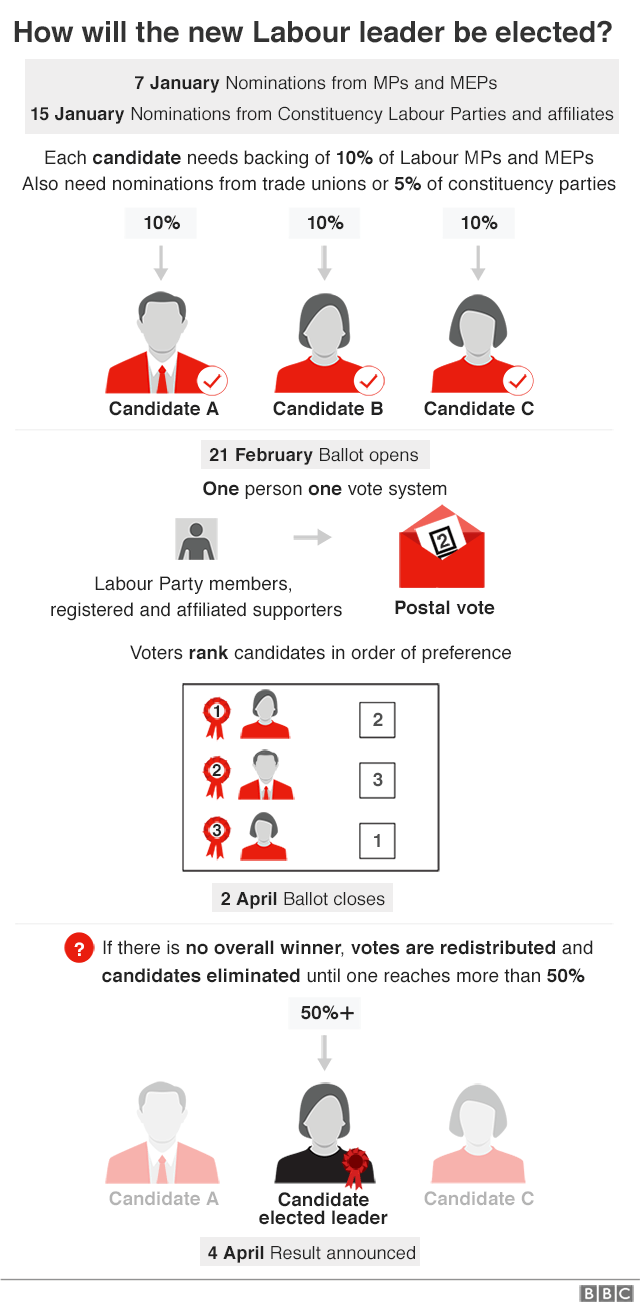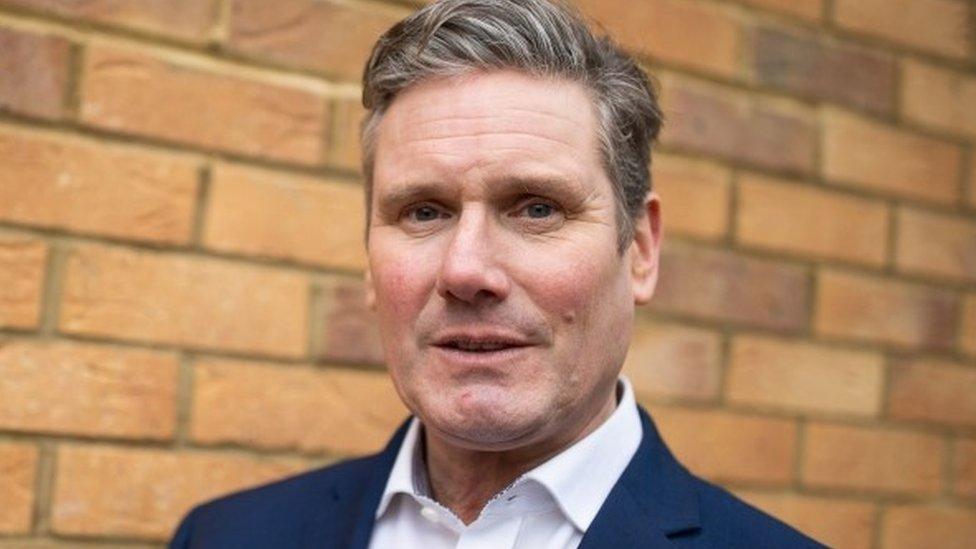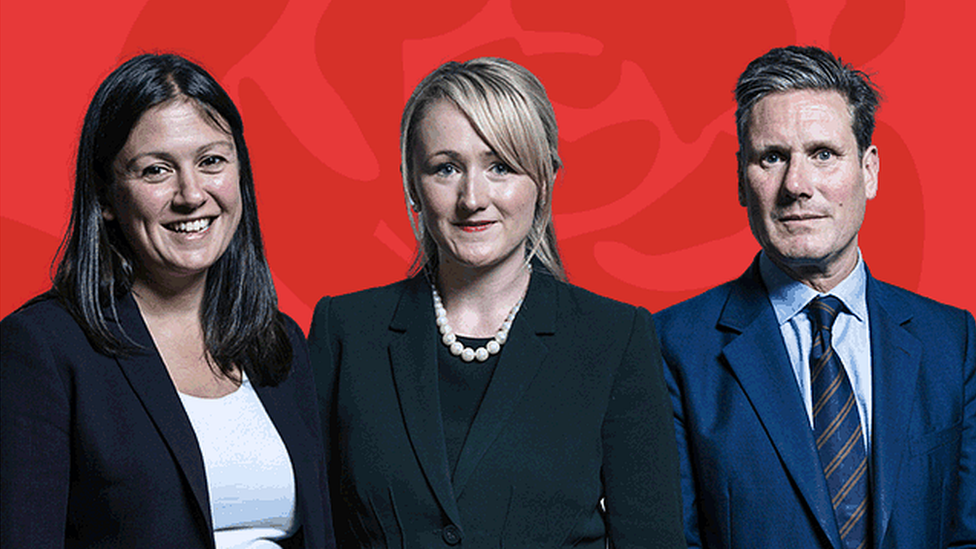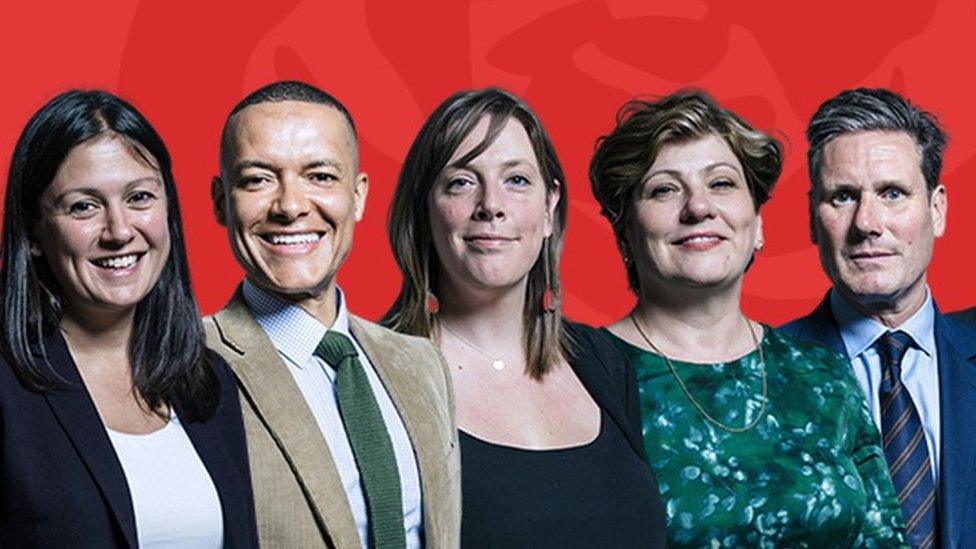Labour leadership: Don't just blame 2019 campaign, Starmer warns
- Published
- comments
Sir Keir Starmer: We've lost four elections in a row
Sir Keir Starmer has warned against blaming Labour's historic election defeat on its 2019 campaign alone.
The leadership candidate said the party had been losing votes in its heartlands for a "long time" and had lost four general elections in a row.
People wanted "fundamental change" but did not trust Labour to deliver it, he told the BBC's Laura Kuenssberg.
He vowed to restore trust in Labour "as a force for good and a force for change" and end factional infighting.
But he refused to say whether his politics were closer to Tony Blair or Jeremy Corbyn, saying: "I want to lead a Labour Party that is trusted enough to bring about fundamental change.
"I don't need somebody else's name or badge to do that."
The BBC's political editor is aiming to interview all five Labour leadership hopefuls before the result is announced on 4 April.
'Overloaded manifesto'
Sir Keir, who has been endorsed by Britain's biggest union, Unison, said he could "unify the party" and "forge a path to victory at the next general election".
"We need to unify the party and I think I can do that," he said.
"We spent far too much time fighting ourselves and not fighting the Tories. Factions have been there in the Labour Party - they've got to go."
Some on the left have blamed the election defeat on Sir Keir and others at the top of the party promoting another Brexit referendum.
He said: "We were trying to bring together both sides whether they voted Leave, or they voted Remain.
Sir Keir Starmer: I think I can restore that trust in Labour
"But I think the idea that Brexit was the only issue in this election is wrong, or even that in our heartlands it was the determining factor because actually if you look at what's happened in our heartlands we've been losing votes there for a long time."
Speaking at a pub in Somers Town, in his Holborn and St Pancras constituency, he said he believed Labour could win last year's election, even though the "odds were against us", but added: "In the end people didn't have trust in us.
"Partly that was to do with the leadership, rightly or wrongly, partly it was to do with Brexit, anti-Semitism came up, and the overload of the manifesto."
He said Labour needed to "restore that trust, but if we only look at the 2019 election we're missing the fact that we've lost four in a row".
He said his priority, as a "moral socialist", would be tackling the "gross inequality" in British society and ensuring "equal opportunity for everyone, wherever they come from and whatever their background".


"I don't need someone else's name or badge."
Sir Keir Starmer wouldn't today reveal whether he saw his ideas and his ambitions for the country as closer to Jeremy Corbyn or Tony Blair.
Instead, when we sat down in a north London pub in his constituency, he wanted to make the valid argument that different leaders work in different eras, confronting different problems.
Times change, essentially, and the next leader, he believes, needs to be looking to the next set of issues and try to take the party by the scruff of the neck and make it into an effective opposition straight away - but with an eye on where the political battles will be in 2024.
But his obvious reluctance to plant a flag somewhere on Labour's wide political spectrum is perhaps representative of the problem that he faces in this race.

Hustings planned
Sir Keir admitted he does have friends who are Tories, and that he received support from colleagues on the Conservative benches when his father died in 2018.
The shadow Brexit secretary said he judged people "by what they say and who they are, rather than which party they're in".
The five leadership contenders - Sir Keir, Rebecca Long-Bailey, Emily Thornberry, Jess Phillips and Lisa Nandy - are set to take part in a series of hustings around the country, starting in Liverpool on Saturday.
They need the support of 5% of local parties or at least three affiliates - two must be unions - by 14 February to make it on to the final ballot of party members.
The new leader will be announced on 4 April.
It comes as the grassroots pressure group Momentum endorsed Mrs Long-Bailey.
The group, which grew out of Jeremy Corbyn's 2015 leadership campaign, said it would mobilise thousands of supporters to elect Mrs Long-Bailey as the next Labour leader.
Momentum polled members on whether it should officially back Mrs Long-Bailey, with 70% of those who took part endorsing the plan, and 52% backing Angela Rayner as her deputy.
Around 14,700 people applied to register as temporary supporters of Labour to vote in the leadership contest, the party has said.
The 48-hour window to apply to be a temporary supporter closed at 17:00 GMT on Thursday. Applicants who meet the eligibility requirements will be able to vote in the leader and deputy leader elections.


- Published8 January 2020

- Published18 February 2020

- Published6 January 2020
